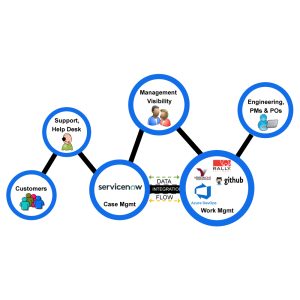Artificial Intelligence (AI) has become one of the most important drivers of digital transformation. While dozens of AI platforms exist today, very few can claim the enterprise-grade credibility, governance, and adoption that IBM Watson AI has achieved. From its early days as a question-answering system on Jeopardy! to its current role as an enterprise-ready AI suite, Watson has evolved into a trusted tool for organizations across industries.
One of the most common questions enterprises ask is: Who uses IBM Watson? The answer is both broad and specific. Banks use it to fight fraud and automate loan processing. Retailers apply it to personalize shopping and analyze customer sentiment. Healthcare providers rely on it to assist with clinical decisions and streamline patient data management. Each industry tailors Watson to its own domain-specific needs, proving its flexibility and value.
In this blog, we’ll explore real-world IBM Watson users across finance, retail, and healthcare three industries where AI has already proven transformative. Along the way, we’ll show how tools like IBM business analytics and Watson’s cognitive services are reshaping the way enterprises operate, comply, and compete in a data-driven economy.
Why Enterprises Choose IBM Watson AI
Before diving into industry examples, it’s important to understand why IBM Watson AI has become the AI of choice for enterprises.
- Domain-Specific Customization – Watson can be trained using Watson Knowledge Studio to understand the unique language of healthcare, finance, or retail.
- Integration with IBM Business Analytics – Watson doesn’t work in isolation; it integrates with IBM Cognos Analytics, Planning Analytics, and Watson Studio to deliver insights directly into business workflows.
- Scalability & Governance – Deployed through IBM Cloud Pak, Watson supports hybrid and multi-cloud environments, ensuring compliance with GDPR, HIPAA, and other regulations.
- Automation Power – From customer support chatbots to automated risk scoring, Watson enables enterprises to replace manual processes with intelligent automation.
- Proven Track Record – Unlike many newer AI platforms, IBM Watson has been tested across Fortune 500 firms, government agencies, and global institutions.
For decision-makers wondering is IBM Watson worth it, these features highlight its ability to balance innovation with compliance, making it a dependable choice.
IBM Watson in Finance
The financial sector has been one of the earliest adopters of Watson due to its data-heavy, regulation-bound, and risk-sensitive environment.
1. Fraud Detection and Risk Management
Banks handle billions of transactions daily, making fraud detection one of the most critical use cases. Watson AI analyzes patterns in real time, flagging anomalies and suspicious behavior faster than human teams. This reduces financial losses and improves compliance reporting.
2. Automated Loan Processing
Traditionally, loan approvals involve extensive manual document reviews. Watson automates this by analyzing credit histories, income documents, and compliance checks, reducing approval times from days to minutes.
3. Customer Support with Voice AI
Financial institutions increasingly use Watson AI chatbots and voice assistants to answer customer questions. These systems handle everything from account balances to mortgage queries, freeing up human agents for complex cases.
4. Regulatory Compliance
Banks face strict frameworks like Basel III and AML requirements. With Watson, they can automate reporting, track data lineage, and ensure compliance.
Case Example:
A European bank deployed Watson Discovery for regulatory document analysis, cutting compliance costs by 30% while improving accuracy in audits.
So when we ask who uses IBM Watson in finance, the answer ranges from global investment banks to local credit unions seeking AI-driven compliance and automation.
IBM Watson in Healthcare
One of the most frequent queries in AI adoption is: What is IBM Watson used for in healthcare? The healthcare sector produces immense volumes of structured and unstructured data from electronic health records to radiology notes and Watson excels at extracting meaning from this complexity.
1. Clinical Decision Support
Doctors use Watson to analyze patient histories, medical literature, and diagnostic data. For example, Watson can suggest possible treatments based on the latest oncology research.
2. Patient Data Management
Hospitals struggle with fragmented records. Watson AI unifies patient data into a central platform, improving collaboration between departments and ensuring no critical information is lost.
3. Drug Discovery and Research
Pharmaceutical companies use Watson to analyze millions of journal articles and clinical trial datasets, speeding up the discovery of new drugs.
4. Accessibility and Patient Engagement
Watson Text to Speech helps make healthcare services accessible to visually impaired patients, while chatbots help schedule appointments or answer medical FAQs.
Case Example:
Memorial Sloan Kettering Cancer Center used Watson for Oncology to provide doctors with evidence-based treatment recommendations. This shows how IBM Watson users in healthcare benefit from augmented decision-making and reduced cognitive load.
IBM Watson in Retail
Retail is an industry where customer experience is everything. Retailers are constantly asking: How can IBM Watson help us personalize services and increase sales?
1. Personalized Shopping
Retailers use Watson AI to analyze customer preferences, purchase history, and browsing behavior. This enables hyper-personalized recommendations across e-commerce platforms.
2. Supply Chain Optimization
Watson helps retailers forecast demand and optimize supply chains by analyzing seasonal trends, weather patterns, and regional sales data.
3. Customer Sentiment Analysis
Watson Natural Language Processing (NLP) tools monitor customer reviews, social media posts, and feedback to measure sentiment. This helps retailers adapt strategies in real time.
4. AI-Powered Customer Service
Watson Assistant powers retail chatbots that answer product queries, manage returns, and provide order updates, reducing call center workloads.
Case Example:
Macy’s piloted “Macy’s On Call,” a Watson-powered mobile app that guided shoppers through stores and answered questions in natural language. This highlights how IBM Watson users in retail gain a competitive edge through enhanced customer engagement.
Cross-Industry Benefits of IBM Watson AI
Across finance, healthcare, and retail, some benefits of IBM Watson AI consistently stand out:
- Automation at Scale – Watson enables enterprises to automate high-volume tasks such as compliance reporting, fraud checks, and chatbot queries. This reduces human error, minimizes repetitive workloads, and allows teams to focus on more strategic, value-adding activities.
- Improved Accuracy – By training Watson with domain-specific models, businesses ensure the AI understands technical jargon and regulatory language. This increases precision in sensitive areas like medical diagnoses, risk assessments, or contract reviews.
- Enhanced Customer Experience – Whether for patients, shoppers, or banking clients, Watson provides faster, more personalized interactions. Natural language processing and voice capabilities make service more intuitive and engaging.
- Stronger Governance – Integrated with IBM business analytics, Watson ensures transparency with features like explainable AI and audit trails. This helps organizations maintain compliance with strict industry standards.
- Scalable AI Deployments – Powered by IBM Cloud Pak, Watson can scale across on-premise, hybrid, and multi-cloud setups. This flexibility supports enterprise growth without compromising security or performance.
Challenges in Adoption
While Watson’s potential is clear, enterprises face common challenges:
- Data Privacy – Sensitive data (e.g., medical records, financial histories) must be anonymized and protected.
- Skilled Workforce – AI adoption requires both technical and domain expertise.
- Change Management – Shifting from manual to AI-driven processes often meets resistance.
- Continuous Model Updates – AI models need retraining to stay accurate as data evolves.
Partners like Nexright help enterprises overcome these barriers with AI readiness assessments, implementation strategies, and ongoing optimization.
Why Nexright?
As an IBM Solution Partner, Nexright specializes in helping businesses adopt Watson AI and IBM business analytics solutions tailored to their industries.
- Readiness Assessments – Evaluate current systems and identify AI opportunities.
- Tailored Implementations – Deploy Watson AI for specific use cases like fraud detection, patient engagement, or retail personalization.
- Integration with Analytics – Connect Watson with IBM Cognos and Planning Analytics for real-time decision-making.
- Continuous Optimization – Monitor, retrain, and refine models to ensure long-term ROI.
With Nexright’s expertise, enterprises can confidently move from pilot projects to enterprise-wide AI adoption.
The Future of IBM Watson Users
So, who uses IBM Watson today, and who will use it tomorrow? Currently, the platform is deployed by some of the world’s largest banks, hospitals, insurers, and retailers. Moving forward, we expect adoption to expand across government, education, and energy sectors, where complex data and compliance also dominate.
Watson’s integration with open-source tools like Python and TensorFlow, combined with its enterprise governance through IBM Cloud Pak, positions it as one of the most future-ready AI platforms in the market.
Moving Forward with IBM Watson AI
Over the past decade, IBM Watson AI has moved beyond its origins as a pioneering cognitive system into a robust platform designed for enterprise transformation. Today, Watson powers solutions across industries such as finance, healthcare, and retail helping organizations fight fraud, provide evidence-based medical insights, and create personalized shopping experiences. Its ability to adapt to domain-specific needs makes it one of the most flexible AI ecosystems available.
Across every industry, the motivation for adopting Watson is clear: businesses want to automate repetitive processes, improve decision accuracy, and deliver customer experiences that are faster, smarter, and more engaging. Just as importantly, they want to do so while maintaining compliance, transparency, and governance areas where Watson excels thanks to its integration with IBM business analytics and its deployment through secure, hybrid cloud environments.For organizations still wondering, is IBM Watson worth it? the answer lies in the measurable results. Enterprises are cutting costs, accelerating decision-making, and unlocking innovation with Watson AI. By partnering with Nexright, you gain the expertise to design, deploy, and scale Watson solutions that align with your goals. This ensures that AI is not just a technology investment but a true driver of sustainable business growth.




